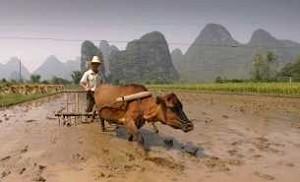My home town, a distant suburb county of Wuhan City in Hubei Province, had been known as the land of abundance fish and rice since the Ming and Qing dynasties. The China's Great Famine (the period of 1959-1961) documented in the Guinness Book of World Records had already passed when I was born in 1964. From my earliest recollections, the village was constantly in short supply of grains.
My mother is a frugal and very diligent woman. She was good at using in proper proportions wild plants and herbs with food grains other than wheat and rice. This kept the family from starving during the years with normal harvests. The flood in 1969 was the only exception. We had no alternative but to beg for food. I still remember being hungry on a freezing morning, when we leaned against the doors of other families. We murmured, “Please give me something to eat. We lost everything in the flood.”
The shortage of grains still existed until 1980, when I left home to attend the university in Xi'an City. I had a hard time understanding why my classmates would spend money to buy baked sweet potatoes. I had eaten enough sweet potatoes in my village and I would not take a sweet potato even if it were a free meal to me! During the flood of 1969, the availability of emergency food was far below demand. All the families in the village walked about one hundred kilometers to the mountain area carrying rice to trade for sweet potatoes. Sweet potatoes became the main staple of our meals for a long time. We simply wished every day were just like New Year, so that we could have eaten a bowl of rice.
I could not go home during my studies at the university at Xi'an because I could not afford the traveling expenses during summer and winter breaks. After two years, my parents sent me the money to return for a visit in early 1983. I noticed a lot of changes in the village during those two years. There was no longer whistling after dinner to gather villagers for work. Instead, every family was preparing for the Chinese New Year. In the past, my fellow villagers were busy all year round. They were allowed to rest for only three days during New Year’s celebration. Further, when the landlord saw me on the street, he happily said hello. In the past, he would have tried to evade me.
Fellow villagers told me excitedly, “Thanks to Deng Xiaoping! We finally can eat rice without limits every day.” “How did Deng Xiaoping resolve this long-standing issue within two years?” I asked, “Did Deng Xiaoping help you plow and transplant rice seedlings?” “How could it be possible? We handle all this by ourselves.” they replied.
“Then, did Deng Xiaoping give you free chemical fertilizers and insecticides?” I continued. “No way! Chemical fertilizers and insecticides are getting more expensive.” they explained. “Ha, Deng Xiaoping must have built the irrigation systems for you ensuring to get high yields irrespective of drought or water logging!” I added. “No, most of the irrigation channels we arduously built in the past have already collapsed.”
“If you have done everything by yourself, why would you thank Deng Xiaoping?” I questioned. “Listen to me, young man. In Mao’s era, the sloping fields suitable for planting sweet potatoes were developed into terraced fields for planting cotton. However, the revenue from selling cotton barely covered the cost of gasoline to pump water for irrigation during the summertime. The marshy areas should be used for planting lotus, but the government forced you to plant rice that is easily drowned in the heavy rains. Deng Xiaoping is great. He lets you plant whatever you want.”
Finally, I realized — the best thing that the Chinese Communist Party could ever do is doing nothing. Just let the farmers plant whatever they want. It is not only true to the countryside, but it should be like this everywhere including factories, stores, schools!
